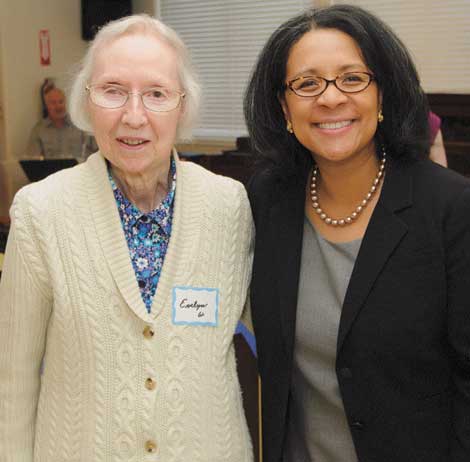Improving the lives of others – this is the focus of the Senior Companion program.
Senior Companions are volunteers age 55 or older who help older adults with physical or mental health limitations. They make a difference in others’ lives by helping them with daily tasks such as shopping, going to doctor appointments, or just getting out of the house for a while and watching a movie.
The program, which is offered through Lutheran Community Services Northwest, helps people remain in their own homes longer, live more independent lives, and improve self-esteem and friendship. Senior Companions help run errands and provide friendship for their clients. Senior Companions typically serve 15 to 40 hours per week, with an average of two to four clients.
With organizations around the nation, Senior Companion Programs have provided assistance since 1974. There are more than 15,000 people in the program nationally, helping to improve the lives of others.
One of these people is Evelyn Wright. She volunteered in the Senior Companion Program for 14 years before retiring in August. She talked to Senior Scene about her time in the program and how volunteers “get back so much more than you put into it.â€
Senior Scene: Why did you begin to volunteer?
Evelyn Wright: I began to volunteer in the year 2000 because I was already doing the same thing. But it was getting harder for me. We had a service coordinator who told me about the program. She kept nagging me and nagging me because she knew I needed the help, and that’s how I started.
SS: You’ve been doing this since 2000. You must be very passionate about it. What keeps you going?
EW: Because you get back so much more than you put into it. They are so eager to give you bits of their wisdom they’ve learned in life, and if I had listened to all of them I would probably be rich and famous! But it’s really a joy, because I’m convinced that I’ll live longer by staying active. I’ll probably keep doing this until my car quits or I quit. You meet so many interesting people; you have no idea when you see someone… what their life was like before. You learn all kinds of amazing things.
SS: What is the best part of volunteering?
EW: I think feeling useful… you’re still connected to everything that’s going on.
SS: What are some of the benefits of volunteering?
EW: I’m convinced it’s good for your health. It’s good for your mind – for most people anyway. It keeps you healthy. I haven’t needed to get a new doctor recently, and I just turned 80.
SS: What do you do with the people you work with, your clients?
EW: Well, a variety of things. One client, who has recently passed away, she was in her 90s. She liked to play bingo, so I took her to the Bonney Lake Activity Center. Every Wednesday we would go up there, and she could socialize. Before she wouldn’t make an effort to come to the rec room or even leave her apartment. Sometimes we help people go grocery shopping. We also go on outings. The Senior Center has that once or twice a month and we can come with them on these trips.
SS: Where do you go on these trips?
EW: The most recent one was going to Tacoma to Wright Park in the conservatory. One time we went up to the Tulip Festival. It’s nice getting people out and about. I hadn’t realized it’s been so many years until someone told me. It goes by so fast. I don’t know if people realize it, but it not only helps the client, but it helps their family. I’ve had several letters from a family when a client has passed away, thanking me for what I did.
SS: If someone were interested in the program, what would you tell them?
EW: Well, you’ll feel better if you’re out and about. You’ll forget about your own ailments. You’ll not only be helping the person, but you’ll be helping yourself. You will make a difference in their life, and yours too. Get out there and volunteer!
If you are interested in becoming a Senior Companion volunteer, and live in Pierce or Kitsap counties, contact Julie Kerrigan, the program director in LCSNW’s South Puget Sound office, at 253-722-5686 or jkerrigan@lcsnw.org.
Chloe Wilhelm, who wrote t

his article, is an LCSNW student volunteer.